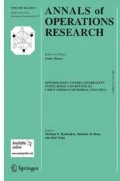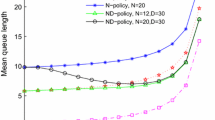Abstract
Energy efficiency and high reliability are major aspects of modern mobile wireless networks. Therefore, it is a critical step to use power management methods along with fault-tolerant techniques. In this paper, we mathematically investigate the Discontinuous Reception, a power saving mechanism in 3GPP LTE wireless networks, with checkpointing and rollback recovery using a variant of an M/G/1 queue with a modified service time and multiple vacations. Due to the lack of enough storage, the mobile device periodically stores its checkpoint data in a stable fixed server, and rolling back to the latest checkpoint when a transient fault or a wireless link error occurs. Various energy and performance metrics are obtained, while constrained optimization problems are formulated and solved. Extensive numerical results are provided, and give an insight into the operation of the model.















Similar content being viewed by others
References
3GPP TS 36.321. (2009). E-UTRA medium access control (MAC) protocol specification. Rel. 8 v. 8.8.0.
Adan, I.J.B.F., & Resing, J.A.C. (2001). Lecture Notes Queueing Theory. Eindhoven University of Technology, http://www.win.tue.nl/iadan/queueing.
Alouf, S., Altman, E., Azad, A.P. (2008). Analysis of an M/G/1 queue with repeated inhomogeneous vacations with application to IEEE 802.16e power saving mechanism. In Proceedings of the 5th International Conference on the Quantitative Evaluation of Systems (QEST 2008) (pp. 27–36), Saint-Malo, France.
Azad, A. P. (2011). Analysis and optimization of sleeping mode in WiMAX via stochastic decomposition techniques. IEEE Journal on Selected Areas in Communications, 29(8), 1630–1640.
Azad, A.P., Alouf, S., Altman, E., Borkar V., & Paschos, G. S. (2009). Vacation policy optimization with application to IEEE 802.16e power saving mechanism. In Proceedings of IFIP wireless days (pp 1–7), 5–17 Dec. 2009, Paris.
Baek, S. & Choi, B.D. (2011). Analysis of discontinuous reception (DRX) with both downlink and uplink packet arrivals in 3GPP LTE. In Proceedings of the 6th International Conference on Queueing Theory and Network Applications (QTNA 2009) (pp. 8–16), Seoul, Korea, ACM, New York.
Baek, S., Song, J. J., & Choi, B. D. (2011). Performance analysis of push-to-talk over IEEE 802.16e with sleep mode and idle mode. Telecommunication Systems, 47(3–4), 291–302.
Biswas, S. & Neogy, S. (2007). A low overhead checkpointing scheme for mobile computing systems. In Proceedings of the International Conference on Advanced Computing and Communications (ADCOM 2007) (pp. 700–705), 18–21 Dec. 2007 doi:10.1109/ADCOM.2007.77, IEEE Xplore.
Bontou, C., & Illinge, E. (2009). DRX mechanism for power saving in LTE. IEEE Communications Magazine, 47(6), 48–55.
Borst, S. C., & Boxma, O. (1997). Polling models with and without switchover times. Operations Research, 45, 536–543.
Chandy, K. M., Browne, J. C., Dissly, C. W., & Uhrig, W. R. (1975). Analytic models for rollback and recovery strategies in database systems. IEEE Transactions on Software Engineering, SE–1(1), 100–110.
Chen, I.-R., Gu, B., George, S., & Cheng, S.-T. (2005). On failure recoverability of client-server applications in mobile wireless environments. IEEE Transaction on Reliability, 54(1), 115–122.
Chen, J. C., Sivalingam, K. M., & Agrawal, P. (1999). Performance comparison of battery power consumption in wireless multiple access protocols. ACM Wireless Networks, 5(6), 445–460.
De Turck, K., De Vuyst, S., Fiems, D., Wittevrongel, S., & Bruneel, H. (2012). Performance analysis of sleep mode mechanisms in the presence of bidirectional traffic. Computer Networks, 56, 2494–2505.
De Vuyst, S., De Turck, K., Fiems, D., Wittevrongel, S., & Bruneel, H. (2009). Delay versus energy consumption of the IEEE 802.16e sleep-mode mechanism. IEEE Transactions on Wireless Communications, 8(11), 5383–5387.
Dimitriou, I. (2012). An unreliable vacation queueing model and its application on the DRX mechanism for power saving in 3GPP LTE. In Proceedings of the Imperial College Energy and Performance Colloquium (ICEP 2012) (pp. 68–71), Imperial College London, 29 May–1 June 2012.
Fuhrmann, S. W., & Cooper, R. B. (1985). Stochastic decomposition in the M/G/1 queue with generalized vacation. Operations Research, 33, 1117–1129.
Gelenbe, E., & Hernandez, M. (1990). Optimum checkpoints with age dependent failures. Acta Informatica, 27, 519–531.
Gelenbe, E., & Hernandez, M. (1994). Virus tests to maximize availability of software systems. Theoretical Computer Science, 125, 131–147.
Hwang, E., Kim, K. J., Son, J. J., & Choi, B. D. (2009a). The power saving mechanism with binary exponential traffic indications in the IEEE 802.16e/m. Queueing Systems, 62(3), 197–227.
Hwang, E., Lee, Y. H., Kim, K. J., Son, J. J., & Choi, B. D. (2009b). Performance analysis of power saving mechanism employing both sleep mode and idle mode in IEEE 802.16e. IEICE Transactions on Communications, E92–B(9), 2809–2822.
Jiang, F.-C., Huang, D.-C. & Wang, K.-H. (2009). Design approaches for optimizing power consumption of sensor node with N-policy M/G/1 queuing model. In Proceedings of the 4th International Conference on Queueing Theory and Network Applications (QTNA 2009) (pp. 1–8), Fusionopolis, Singapore.
Jiang, F.-C., Huang, D.-C., Yang, C.-T., Lin, C.-H., & Wang, K.-H. (2011). Design strategy for optimizing power consumption of sensor node with Min(N, T) policy M/G/1 queuing models. International Journal of Communication Systems, 25(5), 652–671.
Kwon, S. J., Chung, Y. W., & Sung, D. K. (2003). Queueing model of sleep-mode operation in cellular digital packet data. IEEE Transactions on Vehicular Technology, 52(4), 1158–1162.
L’Ecuyer, P., & Malenfant, J. (1988). Computing optimal checkpointing strategies for rollback and recovery systems. IEEE Transactions on Computers, 37(4), 491–496.
Li, G.-H., & Wang, H. (2005). A novel min-process checkpointing scheme for mobile computing systems. Journal of Systems Architecture, 51, 45–61.
Lim, S.-H., Lee, S.W., Lee, B.-H., Lee, S. & Lee, H.W. (2011a). Energy-aware Checkpoint intervals in error-prone mobile networks. In Proceedings of the 6th International Conference on Queueing Theory and Network Applications (QTNA 2011) (pp 128–133), Seoul, Korea.
Lim, S.-H., Lee, S. W., Lee, B.-H., & Lee, S. (2011b). Power-aware optimal checkpoint intervals for mobile consumer devices. IEEE Transactions on Consumer Electronics, 57(4), 1637–1645.
Lin, Y. B., & Chuang, Y. M. (1999). Modeling the sleep mode for cellular digital packet data. IEEE Communication Letters, 3(3), 63–65.
Ling, Y., Mi, J., & Lin, X. (2001). A variational calulus approach to optimal checkpoint placement. IEEE Transactions on Computers, 50(7), 699–708.
Long Term Evolution (LTE): a technical overview. (2007). Technical White Paper, Motorola.
Men, C. & Xu, Z. (2008). Performance analysis of rollback recovery schemes for the mobile computing environment. In Proceedings of the International Conference on Internet Computing in Science and Engineering (ICICSE 2008) (pp 436–443), Harbin, IEEE Xplore.
Ross, S. (1996). Stochastic processes (2nd ed.). New York: Wiley.
Shin, K. G., Lin, T., & Lee, Y.-H. (1987). Optimal checkpointing of real-time tasks. IEEE Transactions on Computers, C–36(11), 1328–1341.
Sumita, U., Kaio, N., & Goes, P. B. (1989). Analysis of effective service time with age dependent interruptions and its application to optimal rollback policy for database management. Queueing Systems, 4, 193–212.
Takacs, L. (1962). Introduction to the theory of queues. New York: Oxford University Press.
Yang, S.-R., & Lin, Y.-B. (2005). Modeling UMTS discontinuous reception mechanism. IEEE Transactions on Wireless Communications, 4(1), 312–319.
Yang, S.-R., Yan, S., & Hung, H. (2007). Modeling UMTS power saving with bursty packet data traffic. IEEE Transactions on Mobile Computing, 6(12), 1398–1409.
Zhang, Z., Zuo, D.-C., Ci. Y.-W. & Yang X.-Z. (2008). The checkpoint interval optimization of kernel-level rollback recovery based on the embedded mobile computing system. In Proceedings of IEEE 8th International Conference on Computer and Information Technology Workshops (pp 521–526), 8–11 July 2008 Sydney.
Zheng, R., Hu, J. & Sha, L. (2004). Performance analysis of the IEEE 802.11 power saving mode. In Proceedings of Communication Networks and Distributed Systems Modeling and Simulation Conference (CNDS), San Diego.
Acknowledgments
The author is grateful to the guest editors and the anonymous referees for the valuable remarks and comments, from which the presentation of the paper has benefited. This work was financially supported by a postdoctoral scholarship program financed by the Research Committee of the Aristotle University of Thessaloniki.
Author information
Authors and Affiliations
Corresponding author
Rights and permissions
About this article
Cite this article
Dimitriou, I. Queueing analysis of the DRX power saving mechanism in fault-tolerant 3GPP LTE wireless networks. Ann Oper Res 239, 521–552 (2016). https://doi.org/10.1007/s10479-014-1662-y
Published:
Issue Date:
DOI: https://doi.org/10.1007/s10479-014-1662-y




